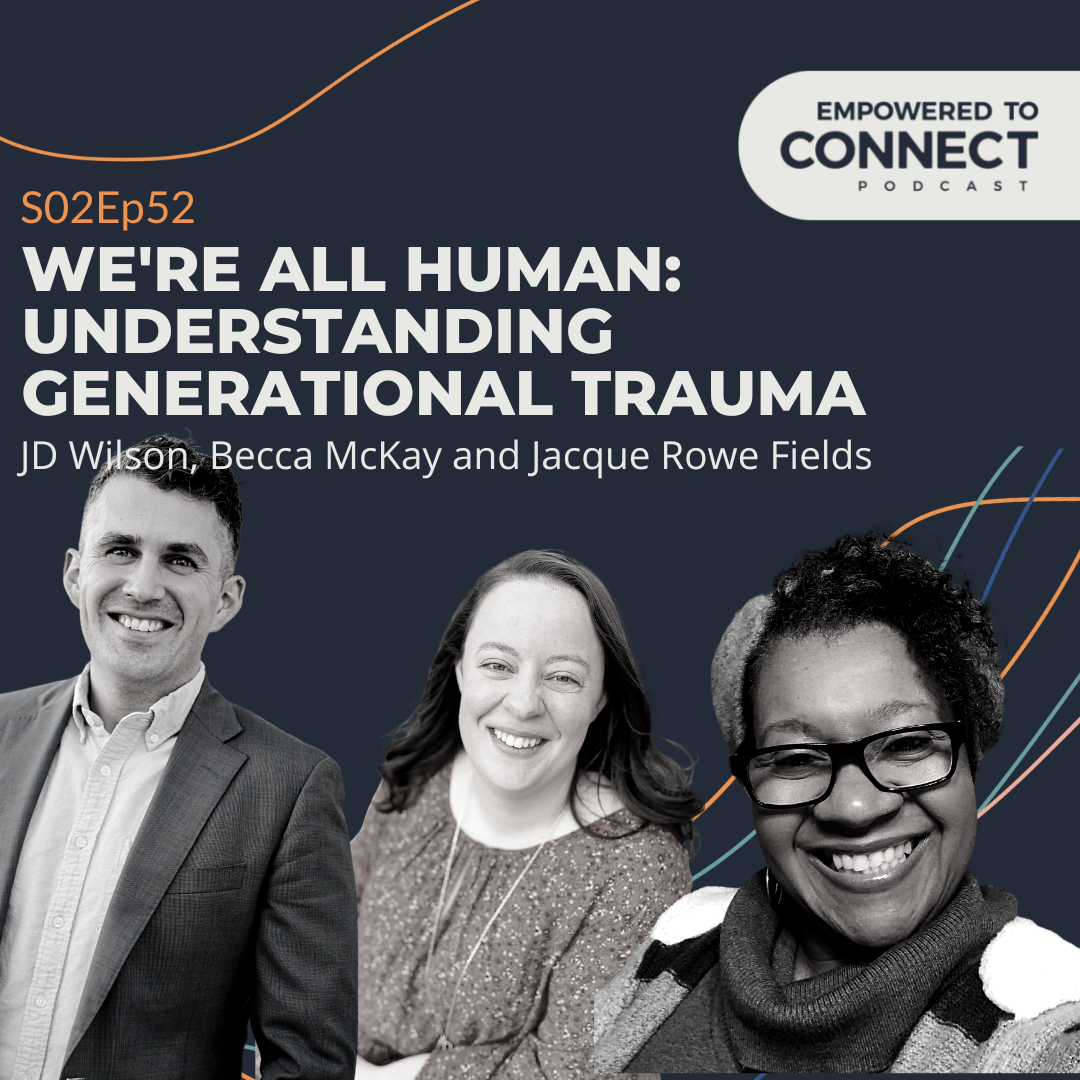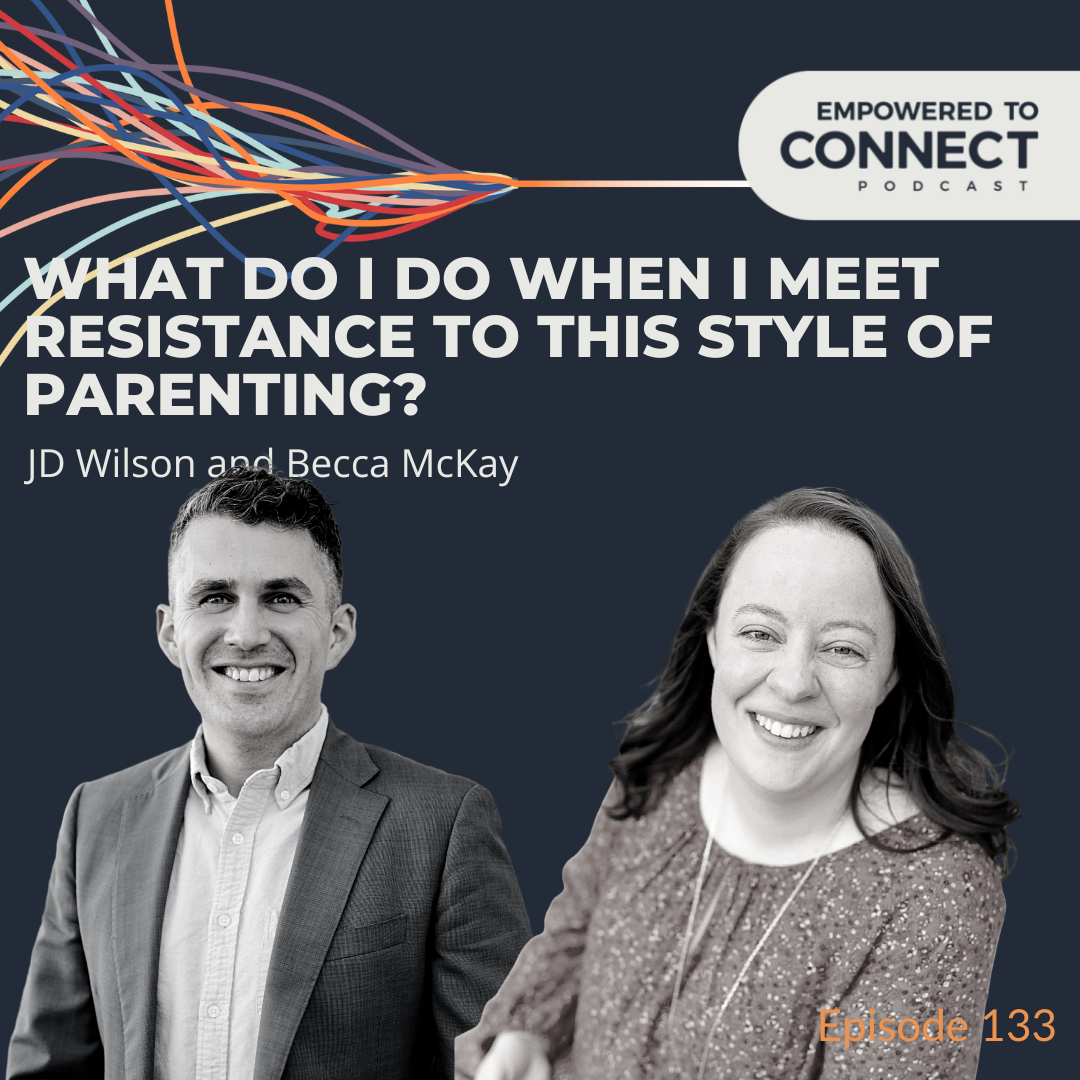Episode Transcript
[00:00:12] Speaker A: Welcome to Carpool Q and A, where we give you one topic, one conversation, about 15 minutes or so, to either start your day or end your day, no matter when you try to listen to it. And so I'm JD Wilson, I'm your host. And we've got Becca McKay with us and Tona Ottinger with us. And we're going to talk about something today. Tana, your topic. So what are we talking about?
[00:00:32] Speaker B: It's my turn to ask the question. Okay, so the topic for today is this. But what about when I lose it with my kids?
[00:00:46] Speaker A: Didn't hear what you said, did you?
[00:00:49] Speaker B: Please repeat. I froze. I just blanked out. JD just went to a stress response. Okay, I heard we lose it again.
[00:01:04] Speaker A: Yeah.
[00:01:04] Speaker B: So I think this is just an important conversation.
I think I relate to it. I feel like I have to sort of talk myself through this a lot. And it's just such a place of so much for parents. So I'd love for us to talk about that.
[00:01:26] Speaker A: I'll just start by acknowledging.
I think there are some of us who are comfortable with failing as parents, and we've kind of learned that rhythm of repairing, and we know that it's part of the process. Blah, blah, blah, blah, blah. There are some of us that immediately when we hear this topic, we get defensive or clammy hands or whatever that stress response is when we start talking about our failures. And it's hard for us to talk about that. So I want to say one.
This conversation is so complex, at least for me, because it is seldom that. And I can just speak on our parenting relationship. For Elizabeth and I, it's seldom that one of us loses it without. Right? Like, I don't mean that universally. I know there are some people who lose it without cause. But what gets so complex, I think, is that a lot of times there's something that is needing to be corrected and some level of pushback that I might deem is unnecessary or too much, or whatever that's coming back from a kid, that escalates it. So what I'm trying to say in a more mature way is. Yeah, but they started.
[00:02:37] Speaker B: Totally, totally. JD's like, it wasn't my start. Okay.
[00:02:41] Speaker A: So I think that's what makes it complex, is that when you're trying to unpack it, sometimes you're like, I wouldn't have flipped out if he hadn't called me a whatever.
[00:02:49] Speaker B: Totally.
Well, I love that you went there, because I think something I think about a lot for myself here, for sure, is.
And look, I'm not asking for, like, a get out of jail free card here. That's not what's going on either. So I do want to be careful that I do think we're the adults.
We would be good if we could be moving to a place of being able to stay more regulated in moments like this or stressful moments when men might normally lose it.
[00:03:23] Speaker A: Right?
[00:03:23] Speaker B: But I also think, personally, the only way I've been able to find access to stay more regulated is by understanding what's going on with me. Why? You're right, JD. There is usually some sort of outside triggering event, if you will. Something has happened in my circumstances, in my situation, in the day, in that relationship, which is usually not just that one instance, I'm bringing some history or some hurt or fear or something into the interaction. And then I have a nervous system. And my nervous system got activated.
[00:04:09] Speaker A: Sorry.
[00:04:09] Speaker B: I have a child yelling, so I'm going to just hit pause right there, and you're going to have to edit that. Okay, hold on.
Okay.
[00:04:17] Speaker C: Thank you.
[00:04:18] Speaker B: I've just managed to be a mom for just a second. So I'm back. So I'm thinking about something's happening in my own nervous system. So this is where I'm like, I don't want to get out of jail free card, necessarily, but I do want to look at my own physiological. I mean, these are the big words. Parasympathetic nervous system reaction of stress.
And maybe that.
Maybe, quote unquote, it shouldn't have been a stressful event. Maybe you're like, come on, Tona, it was a little bit of this or a little bit of that. What do you mean? Your stress response got activated or whatever, but it did. For whatever reason.
My capacity.
I'm still a good parent, but my capacity.
I didn't have as much capacity in that moment to stay regulated through that situation. And there's probably a lot of reasons why. So this is where, when I understand, then I don't go into the spiral of shame or blame or self loathing. I can stay a little bit above it, maybe not in the exact moment, but hopefully fairly quickly, I can get back to sort of understanding what was happening. You're right, JD. So something happened outside.
But why didn't I internally have the resources at my disposal in that moment to navigate that in a way that I'm proud of, if you will? So that's the bigger thing at play, is why. What's happening in me that I couldn't stay regulated, I couldn't respond.
[00:06:02] Speaker C: I want to mention too tana on that note, losing it looks different for every single person. And so when you hear, I lost it again, what you're imagining is your version of losing it. And that's different for all of us, but we all know that feeling, that feeling of I lost control, I lost sense of myself, I lost track of who I was talking to.
I would never intentionally hurt these people that I love so much.
[00:06:31] Speaker A: Right?
[00:06:32] Speaker C: But I did. And I think that's a universally human experience of just sometimes you don't know you're going to lose it till after you've lost it. And then immediately what you're saying, tana, the shame, the guilt or the defensiveness, well, if you hadn't, then I wouldn't. And so I think just recognizing losing it is a human experience. And then your question of why does it happen?
Sometimes that's easy to answer, and sometimes it's hard. So it happens when we don't have that stress capacity window, we don't have capacity to handle whatever's in front of us. And I think we say this all the time, but you really have to get to know yourself, because for some of us, just the fact that it is a Monday morning can be just enough to send us over the edge, because our body is like, I wish it was still the weekend. I don't want to do this. For others of us, it's like more complicated. It's like an anniversary of the loss of a loved one or for others of us, it's like this season is way too stinking busy. There is too many things. If one more person needs a ride to someone's birthday party, I'm going to lose it. So it's just those little stressors adding up. And then you mentioned that can kick your nervous system offline. And so then it can be big or small. It could be directed at the people you love or just in their vicinity.
Oftentimes in my family, one of us, there's two of us right now, traffic is the thing that causes one of us to lose it the most, okay? And that's completely outside of our control. And we live somewhere where the driving.
[00:08:11] Speaker B: Could be improved so much. Yes.
[00:08:14] Speaker C: It can be like, the day is going fine, we're going to something that we love doing, and we're excited about it. And we have to spend so much time getting back to the baseline because we lose it. And so I just want to say, everyone does it.
It looks different for different people. Some of you guys just check out. Some of it's not like you're screaming yelling, but you're just like, why was I not able to stay present with my people? Why did I lose it? Lose my sense of being here? You know what I mean?
[00:08:47] Speaker B: So it looks different or like a desire to run or flee or get out. That need to get out of here, whatever that pull is, could be a form of losing it, right?
[00:08:59] Speaker C: Yeah.
[00:09:00] Speaker B: Well, I would love for us. Oh, sorry, JD, go ahead.
[00:09:02] Speaker A: You go ahead. Because I think mine's changing topics a little bit.
[00:09:05] Speaker B: Well, I want to talk because I don't want us to take too long, but what are some ways, like, outside the moment and inside the moment?
Obviously we need to hit really quickly on repair, like losing it. There is a recovery and repair process.
It's still kind of in the moment. But then I think there's this other question about how do we take care of ourselves? How do we figure out what we need? How do we sort of enter into these maybe more stressful times, more ready to respond rather than react. So what comes to you all's mind when you all think about that?
[00:09:39] Speaker A: Not to shamelessly plug cultivate connection, but when we talk about this in the. It's, well, you guys tell me, because now I'm worried I'm going to mess up the order. Becca.
[00:09:54] Speaker B: Repair, reflect, readjust.
[00:09:58] Speaker A: I had it right. I should have just gone with it.
[00:10:00] Speaker B: Just trust yourself, JD.
[00:10:01] Speaker A: But that reflection, know this is not something universal to dads. This is something universal to this dad. There was not a piece growing up that was regularly practiced by all of us, and that was nobody's. We just were operating with the information we had, right? So for me stopping to think and do some digging on, like, well, why did that set me off? I'll tell you the other day, I'm holding a trash bag, like about to go outside and throw it out and an argument ensues.
I'm not even a part of it. But with mom and a kid and at one point didn't throw the trash bag, it wasn't like aggressive, but out of just frustration and knowing it would make some noise, I just dropped the trash bag and I was like, guys, that's enough. And immediately it was like, whoa, what is up? What is your deal? And so both parties stopped, like, what's going on with you?
[00:10:59] Speaker B: And you're like, what's going on with you all?
[00:11:03] Speaker A: This isn't about me. Don't talk about me without to drop the trash. I had to spend some time later on thinking, like, why did that bother me so bad? And when I talked about it, I realized kind of the link to something deeper that was there. And so it allowed me to then have more clarity in, when I'm repairing.
I'm not blaming it on my past at all, but I'm saying, here are the reasons this matters to me so much, and I'm talking to that kid about that. Right? So it will come up all the time if you don't stop. And stopping is a very un-American thing to do. Right. If we don't stop and think for a second, it does not give us the ability to readjust. Right.
[00:11:47] Speaker B: I agree, JD. If you don't. If you don't have any insight outside the moment, you don't have any insight inside the like, you have to think about it outside the moment, because when our lids are flipped, as Dan Siegel says, and our brains are sort of offline and we're in that reaction mode, we all know what that feels like. We don't think rationally as human beings. So we have to process and reflect and consider and be curious and kind after we lose it, so that we can think about it before we might lose it again.
And then what will happen is, oh, I was tired. Again, not an excuse, but then I can readjust my own personal practices, like, hey, mom, it might be a good idea just to get up 30 minutes earlier to have the whole cup of coffee in you before the kids wake up. Little bitty adjustments, I think, can go a very long way when we're thinking about setting ourselves up to be more capable of staying regulated. Not perfect, but I'm just, like, a little bit more ready again.
[00:13:01] Speaker A: To me, as we kind of close out this episode, to me, this is the argument for parenting in a connected, attachment centered way, because if we are able to help our kids compassionately and empathetically and gently in their blow ups with each other, and when they are blowing up, if we're able to stay calm and to have an empathetic view toward where they're at and to parent through connection with. Connection in mind, if we're able to do that, then in that moment when you lose it, maybe there will be a moment where your kids reflect that back to you. And there's been, whatever, tens of thousands of mess ups. I've had it once. I have had that happen once. That is okay. We all make mistakes.
And that just is like, I feel like I never have to parent again now because it happened one time. I was like, right.
[00:13:56] Speaker B: You're like, and I'm done. You just ran your victory lap, JD.
[00:14:01] Speaker A: My inheritance. I'll be right back.
[00:14:03] Speaker B: Becca, what are your closing thoughts on this idea of getting yourself ready outside the moment or whatever? What are your closing thoughts?
[00:14:12] Speaker C: My closing thought is hindsight is always 2020, and so just don't waste that chance. If you're in a season where you're like, I'm losing it multiple times a day, and you're hearing this pause for a second, is there any little shift you could make? Is there any area where you could get some support that you need, where you could take care of yourself in a different way, where you could ask for help? Lots of people that are listeners are people that are super selfless, and they don't ask for help a lot. And so what do you need?
I hope my other closing thought is, just as we just live life in relationship with people, if we can be super quick to forgive and quick to apologize, I think that goes a long way. Because sometimes as soon as I've said the passive aggressive comment, as soon as it's out of my mouth, as soon as I've flipped my lid, in whatever way that looks, I usually can kind of feel it. But sometimes embarrassment or defensiveness keeps me from just repairing that. And so I think when we can just move towards repair in our relationships, that's such a good model for kids to see, and it's such a good practice to do. So those are my two closing thoughts there.
[00:15:25] Speaker B: My final thought is it's okay to go seek additional outside support. So, to piggyback on what Becca said, we do need to be mindful and careful and thoughtful about those interactions with our kiddos. So if you are feeling like you cannot make headway on staying regulated, I do think it's probably time to seek some therapy or outside support, that kind of thing. Don't think that you may not be able to find your way through those moments alone. And again, no shame, no blame. Like, being a human is hard.
It's my closing thought. I appreciate you all talking about this, and I hope anybody out there might just feel a little bit more seen and not so alone if you're listening to this today. So thank you, guys.
[00:16:15] Speaker A: Yeah, well, for Becca, for Tona. I'm JD, and we'll see you next week on carpool. Q a.


